Once the relationship between Rugby Australia CEO Andy Marinos and chairman Hamish McLennan degenerated to communication only via e-mail, there was only ever going to be one outcome.
The CEO’s exit was confirmed last Monday, and with Marinos constrained by non-disclosure terms attached to his payout, the way was paved clear for McLennan to cement his version of history into the Rugby Australia archives.
That would perhaps be tolerable, if it hadn’t been for some eye-watering overreach; claims which, leaked through compliant media, thinly disguised as ‘news’, stretched credibility further than a Suliasi Vunivalu hamstring.
The Australian newspaper on Saturday, painted a picture of Marinos being “a handbrake on the organisation (Rugby Australia) as it pursued a bold new direction.”
If that’s a bus on its way to collect the Bledisloe Cup, Rugby World Cup, a viable domestic competition and development pathway into professional rugby and a healthy grassroots rugby scene, then that would certainly count as “bold” and “new”. It would be difficult to imagine any rugby fan not clamouring to climb aboard.
Unfortunately the article stopped short of making any such tangible connection, referencing instead initiatives such as signing Sydney Roosters teenager Joseph Suaalii, Wallabies coach Eddie Jones, and the attempted signing of Samu Kerevi to the Melbourne Rebels.
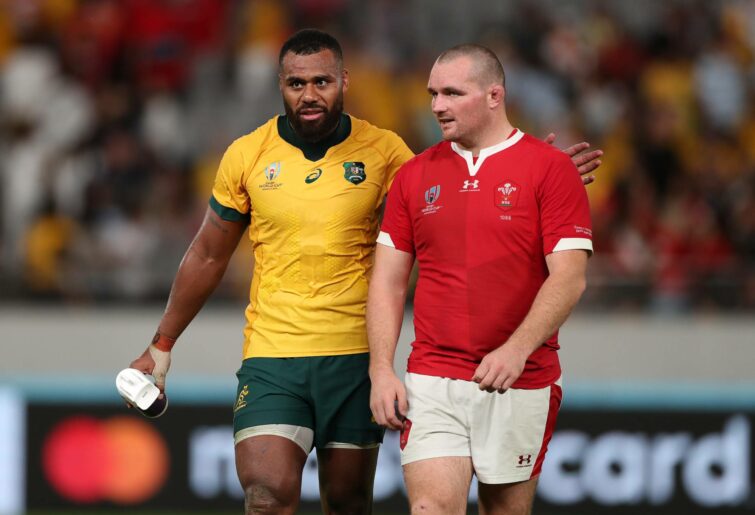
(Photo by Dan Mullan/Getty Images)
‘Handbrake’ Marinos was said to be against these moves, for precise reasons that will – for as long as Marinos’ constraints and his desire not to lower himself to the level of his adversary – remain unknown.
The Australian outlined how in January this year McLennan met with Kerevi and told him he’d “help make the deal happen.”
A deal was brokered where Kerevi would receive $1.2 million a season, a figure Kerevi was said to be happy with. Yeah well, why not?
But after Marinos got involved, the offer was said to have dropped to a figure between $900,000-$1 million, a figure that Kerevi was less happy with. As a result, Kerevi went on to sign instead with Japanese second-division club Urayasu D-Rocks.
Irrespective of Marinos’ involvement, McLennan not making the deal happen as he’d promised Kerevi, makes The Australian’s claim of “it’s clear he (McLennan) knows how to close a deal” a little stretchy. In addition, there were claims that, “The chairman has often been left overseeing player deals and rescuing them.” The hammer becomes the fixer.
Not only that, but recruitment officer too, as it was McLennan who, apparently, “hunted down Suaalii’s number and called the 19-year-old.” Hang on; are we to believe a player who had previously engaged in lengthy negotiations with Rugby Australia, who trains and plays within punting distance of Rugby Australia HQ, was hitherto uncontactable but for McLennan’s initiative?
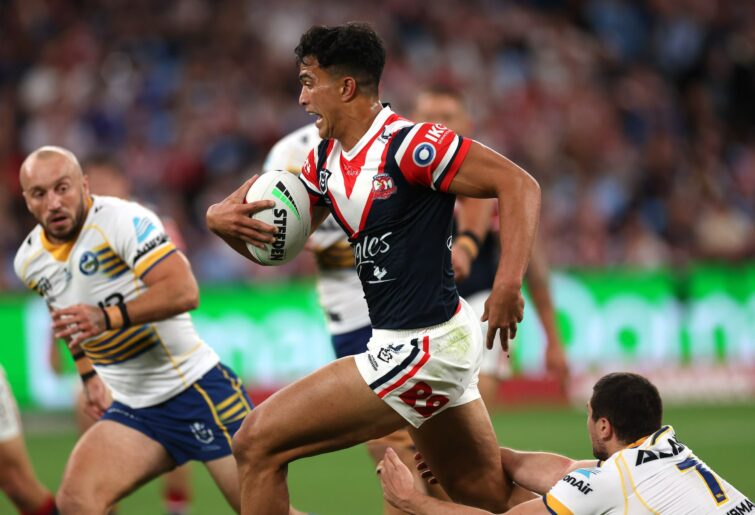
Joseph Suaalii . (Photo by Mark Kolbe/Getty Images)
“Would you be interested in playing rugby for us?” McLennan is said to have asked Suaalii. What makes this quote interesting is not the question itself, but the fact that it could only have been recounted by the two people sharing the conversation.
Nowhere has it been suggested that Suaalii provided that account.
Also interesting is the revelation that Marinos was apparently the only person to vote against the signing of Suaalii at a board meeting in March; not for the way he voted, but the fact that individual player signings go to the board for approval at all.
Is this a signal for the Hugh Sinclairs and Connor Vests of the world to lobby RA board members ahead of their next contract renewals?
What all of this tells us is that, whatever the rights and wrongs, Marinos was effectively made redundant; by a chairman insistent on playing the dual role of chairman and CEO.
Being emasculated in such a fashion is untenable for any self-respecting CEO; moreso one uninterested in a phoney “code war”, and not splashing cash on speculative, high-end player salaries the game – looming private equity injection or not – doesn’t have.
One only needs to look at the collapse of prominent UK clubs – Wasps and Worcester – and the imminent demise of others, to know where this spiral leads. Since when did living within your means become such a dirty proposition?
The Australian’s hypocrisy knows no bounds. During Rugby Australia’s previous administration, a relentless destabilising campaign was waged, under scathing headlines such as “Castle under siege as game spirals into more financial hell”.
In 2020, when Suaalii was courted by Rugby Australia as a 16-year-old, who wrote that a reported “$3m mega-deal” offer made to Suaalii was “unfair to the next generation of superstars of the game, including the likes of (Jack) Maddocks, (Tom) Banks and (Tom) Wright,” and that the offer to Suaalii represented “another point of contention for players who have sat patiently and respectfully for the good of the game.”
Are we now to believe that what was previously financial mismanagement, in part fuelled by indiscriminate spending to attract players from rugby league, is now, all of a sudden, “bold” and indicative of rugby “punching its way back into being a player on the Australian sporting landscape”? What changed?
Well, the chairman changed.
McLennan, of course, may well have the last laugh. But, as postulated last week by The Roar’s Harry Jones, betting the house on Green #2, everyman Eddie, the ex-Randwick hooker, to deliver a World Cup, is quite some gamble.
Eddie Jones continues to work exhaustively in the field to promote rugby in Australia, and deserves nothing but the highest praise for doing so. But there can be no way yet to know if that will translate into the silverware for the Wallabies that Australian rugby fans so desperately crave.
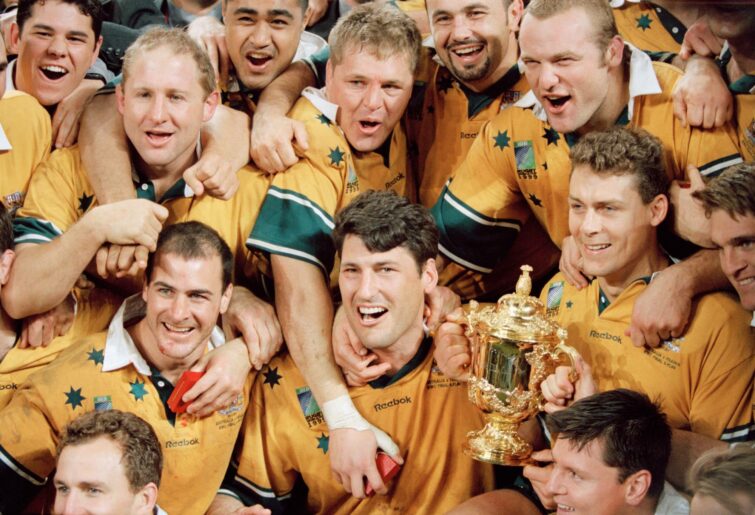
Australian captain John Eales (C) and his teammates celebrate after winning the 1999 Rugby Union World Cup final against France. Australia won the final 35 to 12. (Photo by Franck Seguin/Corbis/VCG via Getty Images)
As it stands, the only reason there is optimism around Australia at the World Cup is because World Rugby’s bumbling has two of New Zealand, South Africa, Ireland and France – all demonstrably better teams over the last four-year cycle – exiting before they even get to engage with Australia’s side of the draw.
Speaking of Ireland, no less than the world’s No.1-ranked nation, their player signings are typically modest; men like James Lowe, Jamieson Gibson-Park, Bundee Aki and Mack Hansen. These are players deemed non-essential to the success of the All Blacks and Wallabies, but malleable enough to fit into a robust system from where their talents could be brought to the surface.
Note how none of these players were signed on anything remotely approaching $1.2m a season, despite the Ireland Rugby Football Union (IRFU) generating, via its involvement in the Six Nations, predictable annual revenues; a recurring river of gold Rugby Australia can only dream of.
Yes, there is internal politicking in Irish rugby, but for the most part it is kept in the backrooms, with combatants understanding which lane they are in, and how the sum of their total contribution, harnessed to a common objective, is greater than that of the individual parts.
Anyone care to nominate who the chairman of the IRFU might be? See what I mean? It’s a man called Niall Rynne, by the way, and good luck finding anything but the most cursory information on him in the media.
Before we leave the political arena, McLennan also found time last week to run himself up the media flagpole as a candidate for the role of World Rugby Vice-President.
It is one thing to try to pull the wool over the Australian rugby public’s eyes, but another thing altogether to negotiate the twists and turns of World Rugby politics. McLennan’s reputation in New Zealand rugby circles is lower than snake’s belly in a dry river bed, and without the Kiwis’ support in actively lobbying on his behalf, his global aspiration is dead in the water.
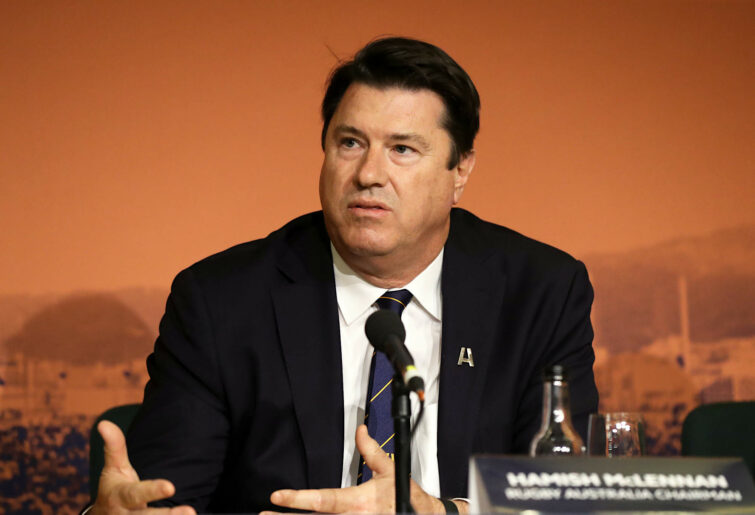
(Photo by Oisin Keniry – World Rugby/World Rugby via Getty Images)
This was also the week the Super Rugby franchise CEOs, fronted by the Blues’ Andrew Hore, but with broad alignment across all of the New Zealand and Australian franchises, got onto the front foot with respect to the establishment of an independent commission to run Super Rugby.
While this prompted some excitable talk about the prospect of a full player draft – it won’t happen and for good reason – there emerged consensus amongst rugby fans and administrators on both sides of the Tasman, that the establishment of such a commission is a necessary and long overdue move.
The only dissenting voice of any note? You guessed it, the man who would potentially stand to lose power, relevance and media presence as a result; Hamish ‘Handbrake’ McLennan.
To the weekend’s rugby and, at last, a genuine upset result, and one excruciating 31-30 near miss for Moana Pasifika against the Blues.
After going ahead 30-24, in the 66th minute, courtesy of a superb ‘second effort’ try to Fine Inisi, Moana Pasifika did everything in their power to hold on at the other end. But extreme duress brought with it persistent offending, and with referee Graeme Cooper gradually (and correctly) picking off their numbers, there was a sense of inevitability around the Blues’ scrum powering its way to a post-siren penalty try.
File under cruel, but character building.
By contrast, the Rebels lacked the same composure as the Blues when faced with a similar situation. Minus their captain, they allowed white-line fever to manifest itself into multiple instances of players being held up over the line and a try being rubbed out for a double movement.
The Rebels remain agonisingly close to the mark, but 33-26 was yet another of those hard lessons needing to be absorbed in order to take the step up to the level of the better sides.
In Dunedin, the Highlanders somehow missed the memo about the danger of kicking deep to Damien McKenzie and Shaun Stevenson, then not following up in a straight, connected defensive line. 52-28 in favour of the Chiefs might be enough to wake them up for next time.
Up the highway in Christchurch, the Crusaders were never troubled by the Force on their way to a 48-13 win; a match notable for the long-awaited return of Will Jordan. Just as Anton Lienert-Brown’s reappearance the night before was a boost for the Chiefs, it’s fair to say that Jordan – the 2023 version – looks like a handy player.
Despite Fraser McReight’s impeccable timing and strong arms, the Waratahs’ scrum and maul dominance always had them in the box seat in Townsville; the 32-24 win edging them closer to one of the contested finals berths.
It was a busy night for Langi Gleeson; drawing praise for his strong ball-carrying, but less love for failing to get a hard shoulder into Matt Faessler to prevent a first-half try. Gleeson was also ribbed by the Stan commentary team for his role in one of those ‘why do they bother?’ sideline interviews, which seemed a bit rich given the shoddy material he was given to work with; Tim Horan’s question being, “Jake Gordon’s led this team in the second half?”
Gleeson’s bemused reply: “Skip does what he does,” felt like much more than what the so-called ‘question’ deserved. A classic case of garbage in = garbage out.
Which also describes the way Lalakai Foketi discharged the contents of his nose in response to Stan’s Sera Naiqama introducing him to a post-match interview. Luckily, Naiqama’s goose-step was as adroit as Foketi’s was, when he finished a delightful second-half try.
The real cause for weekend celebration was that this was one of Fiji rugby’s greatest ever days; the fully deserved defeat of the Hurricanes by the Fijian Drua 27-24, followed by the Fijiana Drua’s 38-30 win over the Queensland Reds in the Super W final, in Townsville.
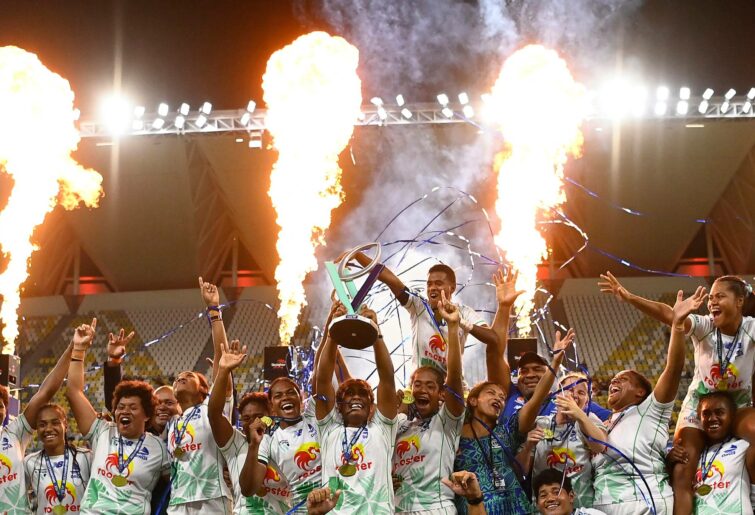
The Drua celebrate after winning the Super W Final match between the Queensland Reds and Fijiana Drua at Queensland Country Bank Stadium on May 06, 2023 in Townsville, Australia. Photo: Ian Hitchcock/Getty Images
Nothing encapsulates the challenge – the real nuts and bolts problem – faced by McLennan and other rugby administrators than this result.
On one hand, franchise rugby in the region is jaded and financially impoverished. Yet support for rugby in Fiji is unbridled and passionate, free of the cynicism and negativity that pervades the Australian and New Zealand discourse. Unfortunately, those Fijian fans, for the most part, happen to be poor; able to wave arms, but not chequebooks.
That the Fijiana Drua were, for the second year running, able to defeat both the Waratahs and Reds – and score some great tries in the process – while being forced in the process to scavenge for lodgings and food, is not Fiji’s problem. It is rugby’s problem.
Advancing rugby in our region, in a dynamic but sustainable way, is an issue of far more import than the indecently hasty need to paint into history the notion that the removal of Andy Marinos was necessary, simply because he didn’t roll with the Suaalii and Kerevi vibe.

































































































